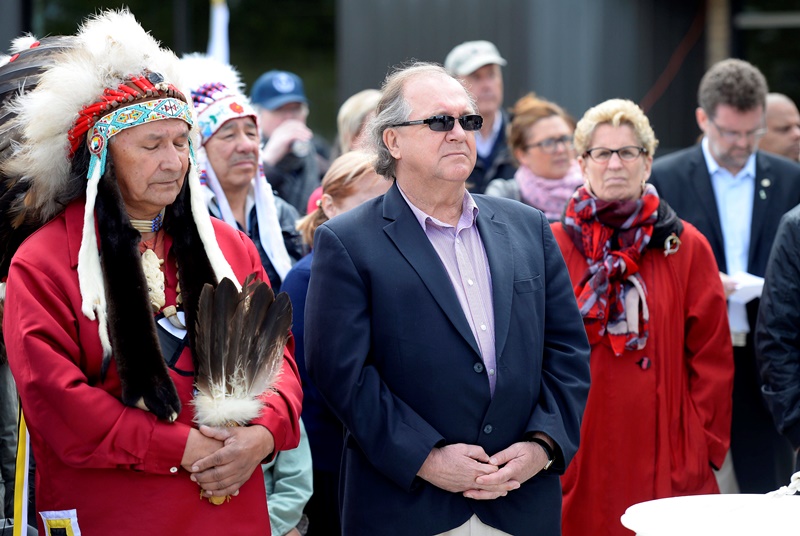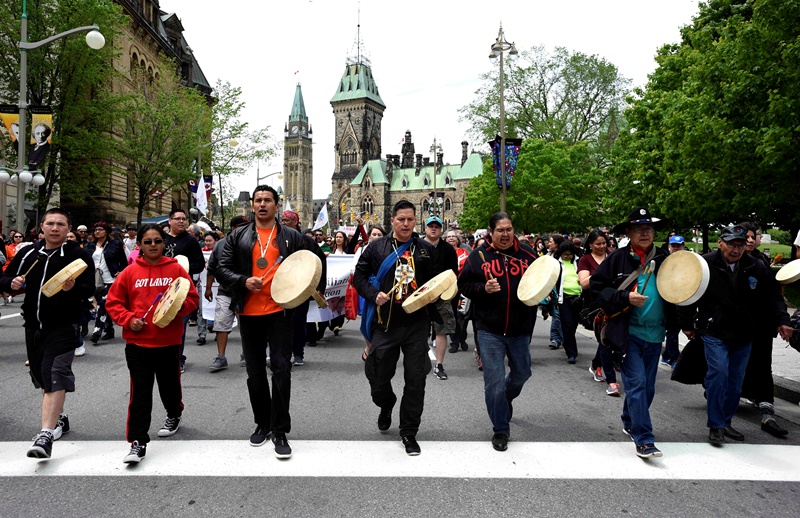WATCH ABOVE: Thousands of Canadians came together for the “Walk for Reconciliation.” Mike le Couteur reports.

TORONTO – Thousands marched through the streets of Ottawa on Sunday in an effort to “transform and renew” the relationship between aboriginal people and other Canadians.
Residential school survivors, along with friends and family, made the symbolic walk under dreary skies along a five-kilometre route from Gatineau, Que., past Parliament Hill and ended at Ottawa’s City Hall.
READ MORE: Up to 6,000 children died at Canada’s residential schools, report finds
The walk comes as the Truth and Reconciliation Commission of Canada prepares to release its final report on residential schools Tuesday. Launched in 2009, the commission was given a five-year mandate to examine a dark chapter in Canada’s history and find out exactly how many aboriginal children died while in these schools.
Politicians from different levels of government walked arm-in-arm with school survivors as a symbol that the way forward is together.
“Let’s not let the events of recent past define us,” Josee Whiteduck, a Kitigan Zibi elder, told crowds in Ottawa.
For the last six years the commission has interviewed more than 7,000 people across Canada hearing testimony about the horrendous abuse carried out in residential schools across the country. For much of the last century more than 150,000 First Nations, Inuit and Metis children were taken from their families and forced to attend government funded, church run schools.
IN PHOTOS:
BY THE NUMBERS: A look at residential schools

Get daily National news
There were also services in other parts of the country, including Vancouver.
“What we’re seeking is express or relationship with the First Nations people of Canada in a spirit of peace and unity, of hope and love,” said Rev. Dr. Peter Elliott of Christ Church Cathedral.
The service offered an opportunity to hear from those who were affected, or had family members affected, by the legacy of residential schools.
“The school where my mother and uncle went and other family members, students were specifically undernourished, for the purpose of studying them like they were guinea pigs or rats. When you hear that kind of stuff, it’s very hard to grapple with. It’s hard not to find a deep anger and resentment,” said Douglas White, Interim Director, Centre for Pre-Confederation Treaties and Reconciliation at Vancouver Island University.
WATCH: Coverage from Vancouver’s event
Justice Murray Sinclair, who heads the TRC, said at least 6,000 aboriginal children died while in the residential school system.
“We think this is a situation that needs further study,” Murray told The Canadian Press.
He added that poor record-keeping has made it difficult to determine the exact figure.
Dominique Rankin, who attended a residential school, said Sunday his road to coming to terms with what happened has been difficult.
“I had a very hard time for healing, to find who I am today. I am Anishnawbe,” Rankin said in Ottawa.
Marie Wilson, a TRC commissioner, hopes the report will help in the healing process. The six-volume summary of the final report will include several recommendations to address the legacy of forced integration.
READ MORE: Aboriginal adoptees suing Ottawa for ‘cultural genocide’
“We as commissioners have had the honour of accompanying you in your journey homeward bound to reclaim your sense of selves and our sense of dignity as a country,” Wilson told a crowd of survivors and reporters in Ottawa.
Honourary witness and Olympic gold medalist Clara Hughes emphasized the importance of remembering this black period in Canada’s history, which former Prime Minister Paul Martin labelled as a genocide.
“The real dark history of our country that most of us aren’t taught in school,” said Hughes. “That we never forget it and we never, ever let it happen to anybody on this soil again.”
*With files from Mike Le Couteur















Comments